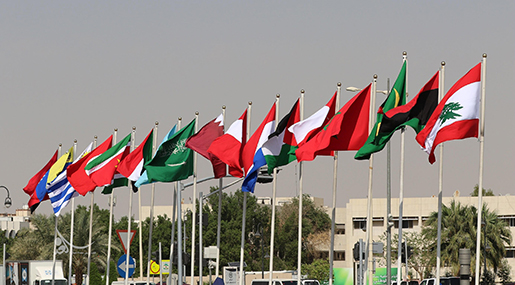The Half-day Summit and its Pre-determined Decisions

Talal Salman
A few Arab leaders, along with a number of ministers who will represent the many (leaders) who will be absent, will meet in "the tent" of Nouakchott, the capital of Mauritania, on the boundary between "Arabs" and "Africans" on the Atlantic Ocean, for the 27th Arab summit. The summit will not take as much time as it took their royal planes to arrive to that forgotten Arab country, in light of its poverty, military rule, and the (presence) of Arab ‘nahda' parties (Nasserists, Baathists, Communists...) as permanent opposition.

Surely some of those that will attend from the countries of the east (Iraq, Saudi Arabia and the Gulf sheikhdoms, in the absence of Umayyad Syria) will scramble to emphasise (to the people of Mauritania) the blood ties that gathered them together in this forgotten Arab state in the heart of the desert of poverty. (People) who see themselves as coming from Bani Hassan, and the tribes of Maktal which moved to (Mauritania) with the Helalis and Bani Salim during the days of the Fatimid caliphate...
In contrast, some Arab officials will recall that Mauritania is a country of military coups, making up most of its independence history (since late 1960), a fact which is recognised by its "big neighbour" Morocco...yet it did not enter the Arab League until 1973, and then the military coups followed one after the other following the overthrow of its first president, Mokhtar Ould Daddah, who renewed his mandate four times from his position as the leader of the "People's Party".
And because Arabs may have become "two groups" or various countries of common identity, basically, and with contrasting policies causing a war between them, practically, they would not care much about (its) internal situations during its own history which has witnessed several military coups, through which the current president has reached power.
In any case, few Arab kings, princes, and presidents will participate in this summit, from which Morocco had "escaped" and offered as a royal gift to this poor country, that was forced to set up a big tent for the "Arab leaders" to meet in. These Arab leaders have refused to lodge in it, so their aircraft engines will remain operating until the completion of the recitation of the final statement. And this will be in any case a repetition of previous summits, Arabic and Islamic, with the addition of golden sentences condemning "Hizbullah" as a terrorist organization (or at least, its military organization, as if there were a difference between civilians and the mujahidin in it).
It does not require a lot of explanation and justification to "convince" the leader of Mauritania, the poor and forgotten country at the end of Arab lands, to join the sectarian camp. The majority of the royals will be present, and the republican minority will never use its veto power. Perhaps the positions of Algeria, Iraq, Lebanon and Tunisia stood out in their objections.
There is no room now to recall history, and to shed the light on the fact that the Mauritanians (who were some Arabs) may have contributed to the liberation of Andalusia, and their country's name includes the word "Mort", that took the meaning in western culture - particularly French - of "enemy" due to their role in Andalusia.
In any case, Arab republics will have a faint attendance at this summit. Kings and princes will occupy its forefront. This summit will take place in the absolute poorest Arab country, in which "Israel" was able to bury some of its atomic waste in its vast desert in 1996.
It goes without saying that the new summit does not belong to the history of the Arab conquests, but perhaps an extension of the decline of active Arab presence, and the lack of attempts to re-unify Arab ranks in the face of threats to Arabs in their existence as a nation...in addition to the absence of Syria by (royal) order, and the absence of Libya, which has more than one government. Iraq will attend, (a country) busy with its fateful and grave problems which threaten to do away with its state, nationalism, and identity. The Prime Minister of Lebanon will attend, (a country) that has no president. Some (Lebanese) ministers (directly concerned with the summit) have apologised and will not attend, without giving any convincing reasons.
Egypt will continue to fail in restoring its leadership role, which was (part of the role it played included directing the annual Arab summit towards being mainly about confronting the "Israeli" project) related to bringing together (the summit's) states due to never-ending differences between their leaders.
It is the half-day summit, in a state lost between a limitless desert and the Atlantic Ocean which links continents together, but which is too narrow to accommodate Arab-Arab differences, and differences between Arab countries whose destinies are almost all threatened.
But it might inspire Mauritanians, most of which are poets, to write a new stanza about the Arab summits of concessions at the expense of Palestine, (summits) which remain too weak to put an end to their differences, which are tied to various reasons and excuses...rather, it may exacerbate the danger to all of their fates.
Source: As-Safir, Translated and Edited by website team
Comments




